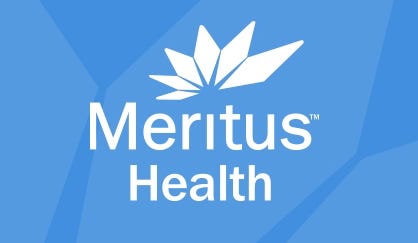With colon cancer screenings, 45 is the new 50

[ad_1]
The last few decades have seen rates of colon cancer rise in individuals age 49 and younger. Famous young people who have succumbed to the disease like actor Chadwick Boseman of “Black Panther” fame has led to more messaging on the risks for colon cancer and at what age screenings should begin.
March’s Colorectal Cancer Awareness Month offers an opportunity to educate the public on the latest recommendations and risk factors. Dr. Aaron George, chief medical officer for Meritus Health and a family medicine physician in the area, explained that when it comes to colon cancer screenings, “45 is the new 50.”

“Both the American Gastroenterological Association and the American Cancer Society recommend that you begin talking with your primary care provider or digestive specialist about screening options at age 45 or earlier,” George said.
With the COVID-19 pandemic and all of the safety precautions taking place in the community, many people were unable to have a routine colonoscopy. This disruption has led to many digestive health specialists with waiting lists for the screenings or patients who have not followed on previously planned procedures.
“This is a cancer that when found early, can often be treated successfully,” George said. “In addition, screenings may detect the presence of pre-cancerous polyps, the benign growths in the colon that can grow larger and become cancer. If these are detected early, they can be removed before this happens.”
If you are 45 or older and missed your colonoscopy during the pandemic or are concerned about the wait time to get your procedure on the calendar, Dr. George recommended discussing the option of other first-tier tests for colorectal cancer screening — the fecal immunochemical test (FIT) or ColoGuard — with your health care provider.
Both FIT and ColoGuard are noninvasive and can be done from the comfort of home. Each allows you to collect a small stool sample that can then be tested to look for hidden, invisible signs that could suggest cancer. There are no special diets or prep for the tests and they could provide evidence for you having a colonoscopy sooner than later.
“The colonoscopy remains the ‘gold standard’ for colon cancer screenings, but a conversation about other first-tier testing methods could be vital to get a person back on schedule and keep concerns at bay,” George said.
Anyone with risk factors – other than age – for colon cancer should not put off necessary screenings. The most common risk factors are family history; blood in the stool or changes in the stool pattern with or without abdominal pain; personal history of polyps or inflammatory bowel disease; and lifestyle choices including smoking, physical inactivity, a diet high in red and processed meats and heavy alcohol use.
If the results of your colonoscopy are normal, another one is not necessary for 10 years, so have a talk with your doctor about getting screened for colorectal cancer today.

Meritus Health, at 11116 Medical Campus Road, east of Hagerstown, is the largest health system in the area, providing hospital and outpatient services to the community. For more information about programs and services, visit MeritusHealth.com.
[ad_2]
Source link
